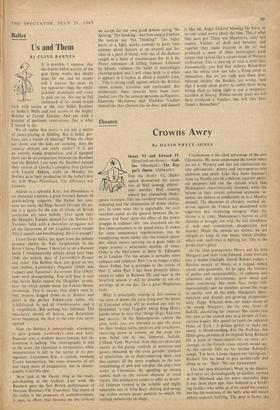Ballet
Us and Them
By CLIVE BARNES
1-r is possible, I suppose, that the frantic ballet activity of the past three weeks has finally done for me, and no sooner will I replace the cover on my typewriter than the white- jacketed attendants will come to pick me up. No one in full command of his senses would look with smiles at the tiny Ballet Rambert at Sadler's Wells and cast scowls at the mighty Bolshoi at Covent Garden. And yet, with a number of pertinent reservations, that is what 1 intend to do.
We all realise that music is not just a matter of piano-playing or fiddling. But is ballet, per- haps. just a matter of dancing? When the chips are down and the kids are jumping, does the creative element not really matter? It is not an entirely stupid proposition, and if accepted there can be no comparison between the Rambert and the Bolshoi. Last week the Rambert danced their version of Gorsky's complete Don Quixote with Lucette Aldous, while on Monday the Bolshoi gave their production of the ballet's first act with Maya Plisetskaya. The difference was fantastic.
Aldous is a splendid Kitri. but Plisetskaya is an elemental creature, a great bravura dancer, of death-defying vulgarity. She flashes her eyes, even her teeth, she flings herself through the air, she is a tigress by the side of whom all British soubrettes are tame tabbies. Then again take the Matador, Espada, danced for the Bolshoi by Yaroslav Sekh with a masculine arrogance not all the classrooms of our kingdom could muster This is superb and breathtaking. But is it enough?
I love Soviet ballet, but apart from the definite promise shown by Yuri Grigorovich in the Kirov's Stone Flower, I have yet to see a Russian ballet I wholeheartedly admire dated later than 1940, the historic date of Lavrovsky's Romeo and Juliet. The Bolshoi have just given us two new ballets, Lavrovsky's Paganini (1960) and Lapauri and Tarasova's Lieutenant Kije (1963); both were disappointing. You will hear it said that Soviet Ballet missed the 'Diaghilev' revolu- tion---by which people mean the Fokine/Benois revolution. This is untrue, they didn't miss it; they became bogged down in it. Romeo and Juliet is the perfect Fokine-style ballet. the Scheherazade to end all Scheherazades, and it is magnificent. But nothing has followed. The neo-classic revival of Ashton and Balanchine never happened. the door to the new style never opened.
Now the Bolshoi is painstakingly attempting to gain ground. Lavrovsky's dim and misty Paganini tries a modern dance fantasy, but the invention is lacking. The choreography is tied to the score, the classicism is inexpressive, while interpretation is left to the acting of its pro- tagonists. Lieutenant Kije, a comedy mocking Tsarist bureaucracy, has some moments of wit and many more of imagination, but its choreo- graphy is terribly thin.
Now look at the David, sling at the ready, pot-shooting at the Goliath. Last week the Rambert gave the first British performance of Norman Morrice's The Travellers. The theme of the ballet is the processes of authoritarianism. It says, in effect, that because we are civilised we accept for our own good notices saying `No Spitting,' No Smoking'—but how long is it before the notices say 'No Thinking?' The ballet starts as a light, quirky comedy (a jazzy little number about dancers at an airport) and fin- ishes in a pool of blood, with one of the dancers caught in a burst of machine-gun fire. It is the Pinter technique of lulling humour followed by bloody violence—the ballet is interestingly choreographed and 1 will come back to it when it appears in Croydon in about a month's time.
This is strong stuff, against which the Bolshoi seems earnest, frivolous and overloaded. But deliberately these remarks have been over- loaded, too. On the same programme as Paganini, Ekaterina Maximova and Vladimir Vasiliev danced the Don Quixote pas de deux, and danced
it like the Angel Gabriel blowing his horn, so no one could worry about the tune. This is what they have got. There was Maximova; witty and superb, Vasiliev all dash and heroism, and together they made traceries in the air and produced a sense of sheer extravagant good nature that looked like a corner-stone of Western civilisation. This is dancing at such a level that, momentarily, you feel that Ashton, Balanchine and the whole crew can take a flying jump at themselves. But we are right and those dear, beloved infidels, the Bolshoi, are wrong. And that I would often prefer to watch them being wrong than us being right is just a temporary accident of history. Within twenty years we will have produced a Vasiliev, but will they have found a Balanchine?






































 Previous page
Previous page